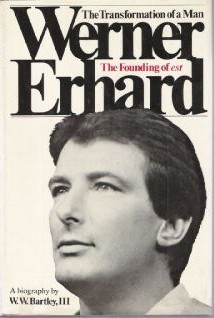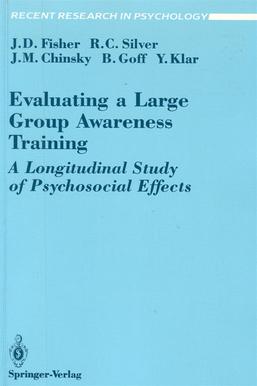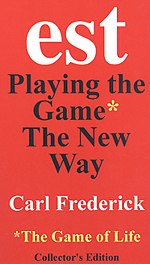Erhard Seminars Training, Inc. was an organization founded by Werner Erhard in 1971 that offered a two-weekend course known officially as "The est Standard Training". The purpose of the training is to help one to recognize that the situations, which seem to be holding them back in life, are working themselves out within the process of life itself. The seminar aimed to "transform one's ability to experience living so that the situations one had been trying to change or had been putting up with clear up just in the process of life itself".

Werner Hans Erhard is an American lecturer known for founding est. In 1985, he replaced the est Training with a newly designed program, the Forum. Since 1991, the Forum has been kept up to date and offered by Landmark Education. Erhard has written, lectured, and taught on self-improvement.
The term large-group awareness training (LGAT) refers to activities—usually offered by groups with links to the human potential movement—which claim to increase self-awareness and to bring about desirable transformations in individuals' personal lives. LGATs are unconventional; they often take place over several days, and may compromise participants' mental wellbeing.
Werner Erhard and Associates, also known as WE&A or as WEA, operated as a commercial entity from February 1981 until early 1991. It replaced Erhard Seminars Training, Inc. as the vehicle for delivering the est training, and offered what some people refer to as personal and professional development programs. Initially WE&A marketed and staged the est training, but in 1984 the est training was replaced by WE&A with a more modern, briefer, more rigorous and more philosophical program - based on Werner Erhard's teachings and called "The Forum".
The Human Potential Movement (HPM) arose out of the counterculture of the 1960s and formed around the concept of an extraordinary potential that its advocates believed to lie largely untapped in all people. The movement takes as its premise the belief that through the development of their "human potential", people can experience a life of happiness, creativity, and fulfillment, and that such people will direct their actions within society toward assisting others to release their potential. Adherents believe that the collective effect of individuals cultivating their own potential will be positive change in society at large.

Semi-Tough is a 1977 American sports comedy film directed by Michael Ritchie and starring Burt Reynolds, Kris Kristofferson, Jill Clayburgh, Robert Preston, Lotte Lenya, and Bert Convy. It is set in the world of American professional football.

Martha Elizabeth "Libba" Bray is an American writer of young adult novels including the Gemma Doyle Trilogy, Going Bovine, and The Diviners.
Joan Holmes is an American psychologist. She was the founding president of The Hunger Project, and served as one of 31 members on 'Task Force 2 on Hunger' of the UN Millennium Project of 2000–2006. She worked as a consulting educational psychologist for Erhard Seminars Training (est) prior to establishing The Hunger Project in 1977.

Outrageous Betrayal: The Dark Journey of Werner Erhard from est to Exile is a non-fiction book written by freelance journalist Steven Pressman and first published in 1993 by St. Martin's Press. The book gives an account of Werner Erhard's early life as Jack Rosenberg, his exploration of various forms of self-help techniques, and his foundation of Erhard Seminars Training "est" and later of Werner Erhard and Associates and of the est successor course, "The Forum". Pressman details the rapid financial success Erhard had with these companies, as well as controversies relating to litigation involving former participants in his courses. The work concludes by going over the impact of a March 3, 1991 60 Minutes broadcast on CBS where members of Erhard's family made allegations against him, and Erhard's decision to leave the United States.

Werner Erhard: The Transformation of a Man, The Founding of est is a biography of Werner Erhard by philosophy professor William Warren Bartley, III. The book was published in 1978 by Clarkson Potter. Bartley was professor of philosophy at California State University and had studied with philosopher Karl Popper. He was the author of several books on philosophy, including a biography about Ludwig Wittgenstein. Erhard wrote a foreword to the book. The book's structure describes Erhard's education, transformation, reconnection with his family, and the theories of the est training.

Evaluating a Large Group Awareness Training: A Longitudinal Study of Psychosocial Effects is a non-fiction psychology book on Large Group Awareness Training, published in 1990 by Springer-Verlag. The book was co-authored by psychologists Jeffrey D. Fisher, Roxane Cohen Silver, Jack M. Chinsky, Barry Goff, and Yechiel Klar. The book was based on a psychological study of "The Forum", a course at the time run by Werner Erhard and Associates. Results of the study were published in two articles in the Journal of Consulting and Clinical Psychology in 1989 and 1990. Fisher and co-authors gave initial context for the study, providing analysis and discussion of academic literature in psychology regarding Large Group Awareness Training.

The Program: A Novel is a novel by Gregg Hurwitz, first published in 2004. It has since been released as an Audio CD, an Audio Cassette, and was reprinted in paperback format, in 2005. Hurwitz's prior book, The Kill Clause, will soon be made into a motion-picture. The Program picks up where The Kill Clause left off, following a series of books by the author involving fictional Deputy U.S. Marshal, Tim Rackley.
Alexander Everett (1921–2005) was a British self-improvement and personal development consultant. He was the founder of the company Mind Dynamics, and author of the motivational books The Genius Within You and Inward Bound. Everett's coursework and teachings had an influence on the human potential movement.

Werner Erhard and his courses have been referenced in popular culture in various forms of fictional media including literature, film, television and theatre. The original course, known as est, was delivered by the company Erhard Seminars Training (est). Under the name The Forum, they were delivered by Werner Erhard and Associates. Also, the Landmark Forum, a program created by Erhard's former employees after purchasing his intellectual property, has had an influence on popular culture. Some of these works have taken a comedic tack, parodying Erhard and satirizing the methodology used in these courses.
Carlton Frederick, better known as Carl Frederick, is an American science fiction author and physicist. His nonfiction book est: Playing the Game the New Way describing the Erhard Seminars Training (est) theatrical experience. reached number 2 on the New York Times bestseller list.

Getting It: The Psychology of est, a non-fiction book by American clinical psychologist Sheridan Fenwick first published in 1976, analyzes Werner Erhard's Erhard Seminars Training or est. Fenwick based the book on her own experience of attending a four-day session of the est training, an intensive 60-hour personal-development course in the self-help genre. Large groups of up to 250 people took the est training at one time.

The Book of est is a fictional account of the training created by Werner Erhard, (est), or Erhard Seminars Training, first published in 1976 by Holt, Rinehart and Winston. The book was written by est graduate Luke Rhinehart. Rhinehart is the pen name of writer George Cockcroft. The book was endorsed by Erhard, and includes a foreword by him. Its contents attempts to replicate the experience of the est training, with the reader being put in the place of a participant in the course. The end of the book includes a comparison by the author between Erhard's methodologies to Zen, The Teachings of Don Juan by Carlos Castaneda, and to Rhinehart's own views from The Dice Man.
Georgess McHargue was an American writer and poet.

The Institute is a 2019 American science fiction-horror thriller novel by Stephen King, published by Scribner. The book follows twelve-year-old genius Luke Ellis. When his parents are murdered, he is kidnapped by intruders and awakens in the Institute, a facility that houses other abducted children who have telepathy or telekinesis.











